|
|
|
Sort Order |
|
|
|
Items / Page
|
|
|
|
|
|
|
| Srl | Item |
| 1 |
ID:
165014


|
|
|
|
|
| Summary/Abstract |
The securitization of health concerns within the European Union has hitherto received scant attention compared to other sectors. Drawing on the conceptual toolbox of actor-network theory, this article examines how a ‘health security assemblage’ rooted in EU governance has emerged, expanded, and stabilized. At the heart of this assemblage lies a particular knowledge regime, known as epidemic intelligence (EI): a vigilance-oriented approach of early detection and containment drawing on web-scanning tools and other informal sources. Despite its differences compared to entrenched traditions in public health, EI has, in only a decade’s time, gained central importance at the EU level. EI is simultaneously constituted by, and performative of, a particular understanding of health security problems. By ‘following the actor’, this article seeks to account for how EI has made the hunt for potential health threats so central that detection and containment, rather than prevention, have become the preferred policy options. This article draws out some of the implications of this shift.
|
|
|
|
|
|
|
|
|
|
|
|
|
|
|
|
| 2 |
ID:
178170
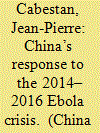

|
|
|
|
|
| Summary/Abstract |
The 2014–16 Ebola crisis in West Africa was China’s very first opportunity to demonstrate its willingness and ability to play a meaningful role in addressing public health emergencies of international concern. China’s decision to participate in the international response to the outbreak was part of an ambition to enhance its contribution to Africa’s security in general and health security in particular and to exert more influence on global norms. The specific role played by the People’s Liberation Army (PLA), especially its Academy of Military Medical Sciences, in Sierra Leone and Liberia is part of an ongoing effort to increase China’s involvement in international humanitarian assistance and disaster relief operations. It was the first time that it sent medical military teams to set up and operate infectious disease hospitals overseas. This participation also underscores the PLA’s crucial role in fighting epidemics overseas as well as at home, as the current COVID-19 pandemic illustrates. The Ebola crisis enables us to explore aspects of the PLA’s overseas missions, some of which are humanitarian and others which generally enhance China’s influence as a great power in Africa and in the world in the context of a growing Sino-US strategic competition.
|
|
|
|
|
|
|
|
|
|
|
|
|
|
|
|
| 3 |
ID:
084184
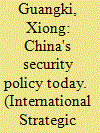

|
|
|
| 4 |
ID:
127089
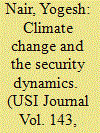

|
|
|
| 5 |
ID:
153252
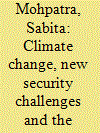

|
|
|
|
|
| Publication |
New Delhi, KW Publishers Pvt Ltd, 2017.
|
| Description |
xvi, 332p.hbk
|
| Standard Number |
9789386288226
|
|
|
|
|
|
|
|
|
|
|
|
Copies: C:1/I:0,R:0,Q:0
Circulation
| Accession# | Call# | Current Location | Status | Policy | Location |
| 059119 | 363.73/MOH 059119 | Main | On Shelf | General | |
|
|
|
|
| 6 |
ID:
172109
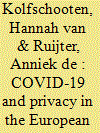

|
|
|
|
|
| Summary/Abstract |
When disease becomes a threat to security, the balance between the need to fight the disease and obligation to protect the rights of individuals often changes. The COVID-19 crisis shows that the need for surveillance poses challenges to the right of privacy. We focus on the European Union (EU), which has a strong data protection regime yet requires its member states to exchange personal data gathered through contact tracing. While public authorities may limit the right to privacy in case of public health threats, the EU provides little guidance when such limitations are proportionate. To define standards, we analyze existing EU case law regarding national security measures. We conclude that on the proportionality of contact tracing in the EU it is difficult to reconcile public health measures and individual rights, but guidance can be taken from understandings of proportionality in the context of security, particularly in the current COVID-19 emergency.
|
|
|
|
|
|
|
|
|
|
|
|
|
|
|
|
| 7 |
ID:
182437
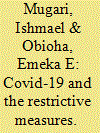

|
|
|
|
|
| Summary/Abstract |
The emergence of the COVID-19 pandemic at the onset of the year 2020 brought unprecedented suffering to humanity. Economic activities in virtually all nations across the globe were brought to a shuddering halt, with the third world suffering the worst effects on the economic front. The health security of nations across the globe was shaken, as nations came to terms with the surging health needs for the infected citizens. In order to grapple with the pandemic, nations took drastic measures, chief among them being the implementation of lockdowns, coupled with harsh restrictions. These measures, however, came at a cost. This paper explores the impacts of the restrictive measures that were implemented by the Zimbabwean government to combat COVID-19 pandemic. The paper interrogates these measures in the context of the national security discourse. In the analysis, the paper also makes reference to South Africa- a more developed nation and Zimbabwe’s neighbour.
|
|
|
|
|
|
|
|
|
|
|
|
|
|
|
|
| 8 |
ID:
182450
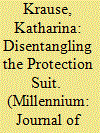

|
|
|
|
|
| Summary/Abstract |
The protection suit is the icon of infectious disease outbreaks. I argue that the protection suit has performative power not only by shaping the daily tasks of health workers and their interaction with patients, but also as a visual artefact and as a two-dimensional image determining how health crises and their security implications are understood and dealt with. The article proceeds in three steps: it firstly highlights the current absence of visuality in the academic literature on health security and makes the case for including it in the debate. Secondly, with recourse to Actor-Network Theory (ANT) it theoretically locates visual representations, as images and artefacts, as actors that act and enact each other in the health-security nexus. The third part of the article follows the protection suit during the Ebola epidemic in West Africa and maps the visual network it creates. In doing so this article demonstrates how the suit as artefact and image constitutes a network that visually and sensually links the bodies of patients, health workers and distant viewers in complex and at times competing makings of health security.
|
|
|
|
|
|
|
|
|
|
|
|
|
|
|
|
| 9 |
ID:
138371
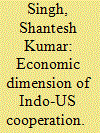

|
|
|
|
|
| Summary/Abstract |
The public health security has been a prime concern in India since independence. It has been related to food security, child and maternal health, malaria, tuberculosis, diarrhea, influenza etc in the beginning. All such problems have accompanied the biggest menace of the recent times for humankind, the HIV/AIDS.
|
|
|
|
|
|
|
|
|
|
|
|
|
|
|
|
| 10 |
ID:
158111
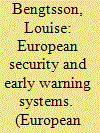

|
|
|
|
|
| Summary/Abstract |
This article critically examines a poorly understood aspect of the European security landscape: early warning systems (EWSs). EWSs are socio-technical systems designed to detect, analyse, and disseminate knowledge on potential security issues in a wide variety of sectors. We first present an empirical overview of more than 80 EWS in the European Union. We then draw on debates in Critical Security Studies to help us make sense of the role of such systems, tapping into conceptual debates on the construction of security issues as either “threat” or “risk” related. Finally, we study one EWS – the Early Warning and Response System for infectious diseases – to understand how it works and how it reconciles risk – versus threat-based security logics. Contrary to assumptions of a clear distinction between risk- and threat-based logics of security, we show that EWSs may serve as a “transmission belt” for the movement of issues from risk into threats.
|
|
|
|
|
|
|
|
|
|
|
|
|
|
|
|
| 11 |
ID:
163176
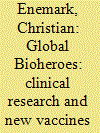

|
|
|
|
|
| Summary/Abstract |
In the pursuit of ‘global health security’, some governments advocate deployment of pharmaceuticals to combat deadly infectious diseases wherever they emerge. Following the Ebola outbreak in West Africa, attention has turned to other emerging diseases and future pharmaceutical solutions. There is growing support for enabling faster clinical research to make new vaccines available sooner. Research on experimental vaccines must ordinarily be consistent with ethical principles designed to protect human research participants. However, where a target disease is framed in security terms, it could be argued that an extraordinary response is required: exposing research participants to more risk in order to accelerate research and enable more lives to be saved pharmaceutically. This article assesses two scenarios of security-oriented research. The scenario envisaged by the Coalition for Epidemic Preparedness Innovations (CEPI) is the propelling of vaccine research through to the stage of human safety-testing before a natural outbreak of the relevant disease. Efficacy and effectiveness tests are then able to be conducted once an outbreak begins. In a hypothetical second scenario, pre-outbreak vaccine research undertaken for the sake of health security would also include efficacy-testing. This would involve the exposure to pathogenic microorganisms of healthy volunteers (‘global bioheroes’) from around the world
|
|
|
|
|
|
|
|
|
|
|
|
|
|
|
|
| 12 |
ID:
187527


|
|
|
|
|
| Summary/Abstract |
This article examines how the ‘health security’ paradigm positions health-related human rights as subordinate to national security concerns. As a consequence, health is viewed instrumentally, shifting the global health response towards maintaining national security rather than upholding human rights. We trace here how both the World Health Organization (WHO) and the United Nations Security Council have approached global health crises, evolving across infectious disease responses to HIV/AIDS, SARS, Ebola and COVID-19. While the Security Council has come to address human rights in select public health contexts, we see that the securitisation of human rights in times of crisis can pose severe limits on individual rights, failing to develop global health solidarity through a commitment to broader health objectives such as Universal Health Coverage. We conclude that the Security Council and the WHO should collaborate towards a rights-based response to COVID-19 that prioritises individual human rights alongside national security concerns, addressing underlying inequities in the global response to infectious disease.
|
|
|
|
|
|
|
|
|
|
|
|
|
|
|
|
| 13 |
ID:
187525
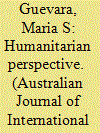

|
|
|
|
|
| Summary/Abstract |
As part of the ‘UN Security Council and Health Emergencies’ collection, this article provides the humanitarian perspective in the collection. Over the last two decades, the UN Security Council has come to play an increasingly prominent role in global responses to health emergencies—including in COVID-19. In this article, scholars from International Relations, Public Health, International Law and humanitarian aid organisations reflect on this developing role, and the consequences (both positive and negative) for global health security efforts. From the humanitarian perspective, the nexus of health and security has become a war on words and a double-edged sword. The article highlights the difference between the ‘securitisation’ of health and securing health, where the latter is what is truly needed in ensuring health for all. It does so by bringing out examples of real field impact and challenges humanitarian actors face when narratives are manipulated as such and what role the UNSC can and should play in allaying negative repercussions.
|
|
|
|
|
|
|
|
|
|
|
|
|
|
|
|
| 14 |
ID:
189910
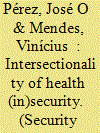

|
|
|
|
|
| Summary/Abstract |
Brazil has suffered severe consequences from the Covid-19 pandemic, currently ranking second globally in terms of total fatalities, with more than 682,000 lives lost. This article critically outlines how a ‘health security’ framework overlooks processes of intersectionality and the varying impacts of the virus on different segments of society, or what we term health insecurity. We organize our analysis around three aspects of the pandemic that have become salient in Brazilian society, namely access to healthcare, disposable workers, and exposure to the virus, and delineate the intersectional impact of gendered inequality, neoliberal ideologies, and racial hierarchies within these three themes. Our methodology employs media and scholarly interpretations of Covid-19, and other secondary empirical and statistical data, to outline the virus’s impacts on differently positioned bodies throughout Brazilian society. Our main findings reveal that during the pandemic, women’s labor and health concerns have been undervalued, exploitative working conditions have been exacerbated, and Afro-Brazilians have been put in situations of higher exposure to the virus in both public and private spaces. This article underscores the need to better examine how public health, systems of oppression and exclusion, and (in)security overlap with each other.
|
|
|
|
|
|
|
|
|
|
|
|
|
|
|
|
| 15 |
ID:
176270
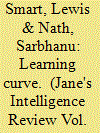

|
|
|
| 16 |
ID:
163175
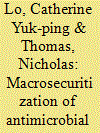

|
|
|
|
|
| Summary/Abstract |
This article has two objectives. Drawing on the framework provided by macrosecuritization, this article first explores global responses to AMR. Secondly, in shifting the analytical lens to Asia, the article then evaluates how successful this process has been in a regional context. Considering the two objectives, two inter-related arguments are proposed. First, even though AMR can be considered a quintessential and successful macrosecuritization case at the global level, within Asia the operationalisation of AMR strategies is limited by power and resource politics within the states. Second, the anthropocentric nature of health security is limited when it comes to address the threat posed by AMR. Overcoming this limitation requires a One Health approach. However, the successful articulation of this approach has proven challenging in Asia where middle-level actors pull away from the process in pursuit of other agendas. As a result, while macrosecuritization provides a useful tool for understanding how AMR and similar health threats are addressed, it is necessary to understand the local realities within which the process is embedded.
|
|
|
|
|
|
|
|
|
|
|
|
|
|
|
|
| 17 |
ID:
163174
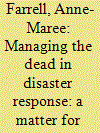

|
|
|
|
|
| Summary/Abstract |
This paper explores the securitisation-desecuritisation nexus in managing threats to health, drawing on a case study examining the management of the dead in disaster response in the Asia-Pacific region. While securitising health threats may galvanise political action to address capacity, infrastructure and resource constraints, it is vital that the shift towards desecuritisation takes place once the immediate threat is under control. This is because desecuritisation is likely to create an environment in which established humanitarian, public health and forensic practices for addressing such threats can proceed in the context of normal politics. It will also offer greater flexibility for pursuing post-threat resilience strategies which will enhance individual and collective health and wellbeing. In turn, this may address broader human security concerns. Conceptualised in this way, resilience should be seen not merely as a strategy for resisting or adapting to a securitised situation but also as a key strategy to be deployed in the context of desecuritisation.
|
|
|
|
|
|
|
|
|
|
|
|
|
|
|
|
| 18 |
ID:
077061


|
|
|
| 19 |
ID:
069941
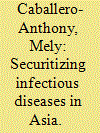

|
|
|
| 20 |
ID:
188855
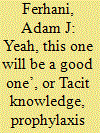

|
|
|
|
|
| Summary/Abstract |
Approaching health security from a practice-theoretical perspective, this article advances our understanding of the everyday and locality in health security decisionmaking, and is guided by the following two questions: How is it determined when a health security threat is likely to be present at a point of entry? What knowledge informs everyday health security decisions at borders? Markedly little is known about health security decisionmaking, though conventional wisdom tells us that health security decisions are based on stringent processes and – importantly – anchored in epidemiological knowledge. The assumed primacy of epidemiological knowledge in health security decisionmaking is well illustrated by the SARS-CoV-2 pandemic: evidence-based responses emerged globally following sophisticated epidemiologic investigation. Are health security decisions always rooted in epidemiology? A 12-month period of non-participant observation of Port Health Officers – who, under the auspices of the 2005 International Health Regulations, are responsible for numerous prophylactic measures at the UK border – gives a unique, privileged entry point for understanding the health security decisionmaking process and tells a story that both questions the centrality of epidemiology and foregrounds the role of tacit knowledge and intuition in health security decisionmaking. This article, which draws on insights from the science and technology studies literature on tacit knowledge, shows how observed health risk taxonomies and corollary decisions in prophylactic border security are predicated almost exclusively on hunches and ‘just knowing’ that something ‘doesn’t feel right’.
|
|
|
|
|
|
|
|
|
|
|
|
|
|
|
|
|
|
|
|
|